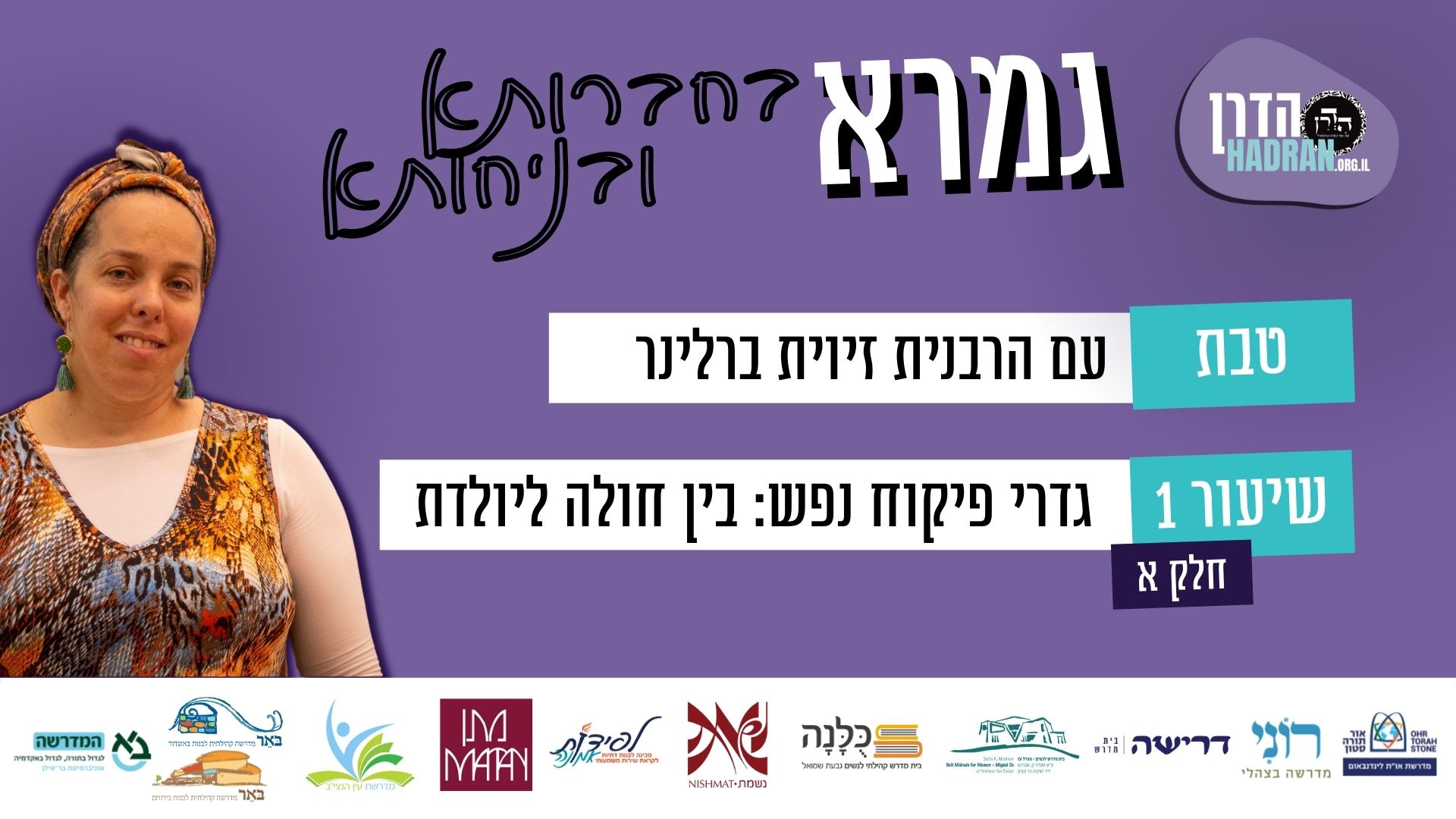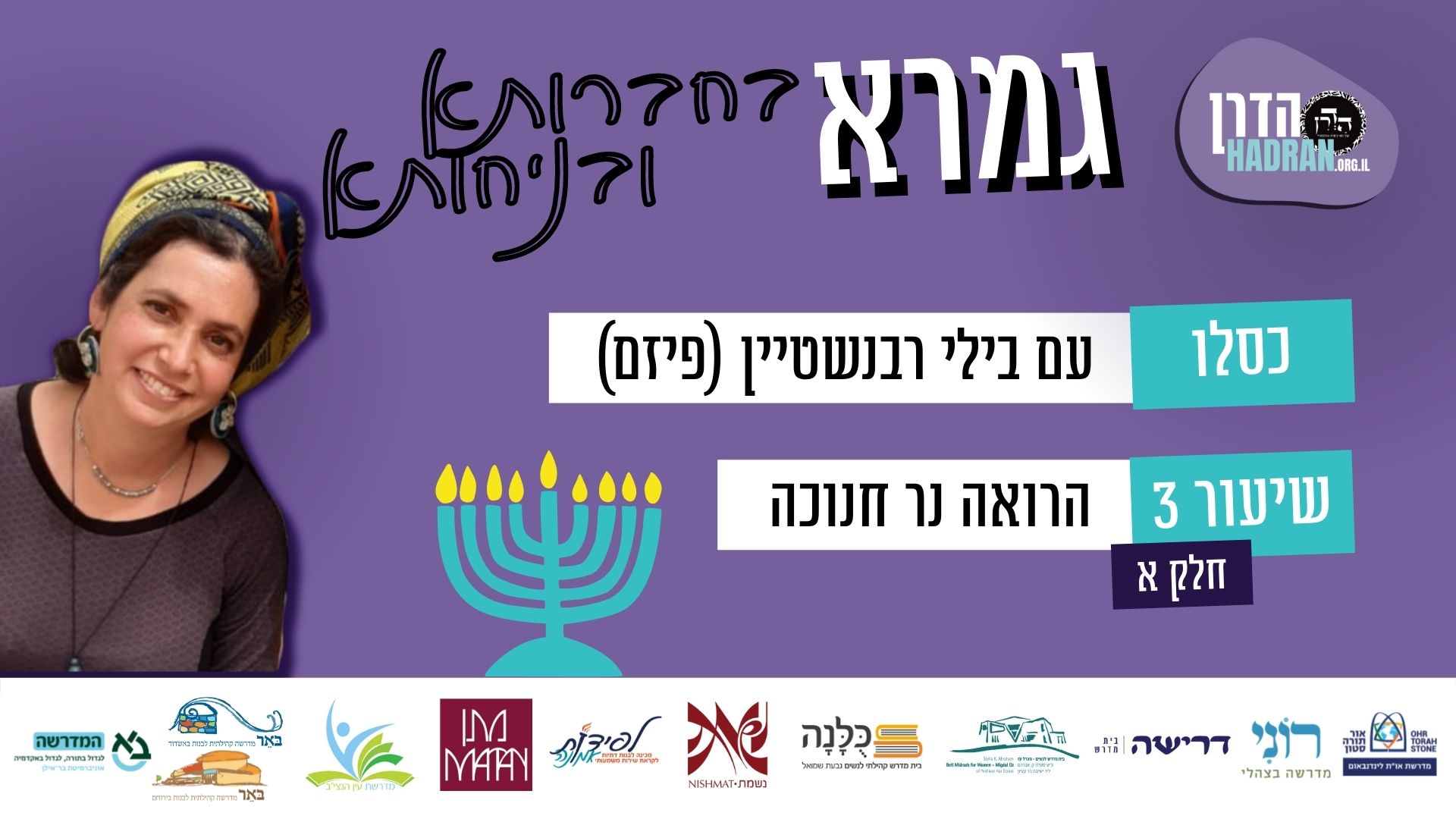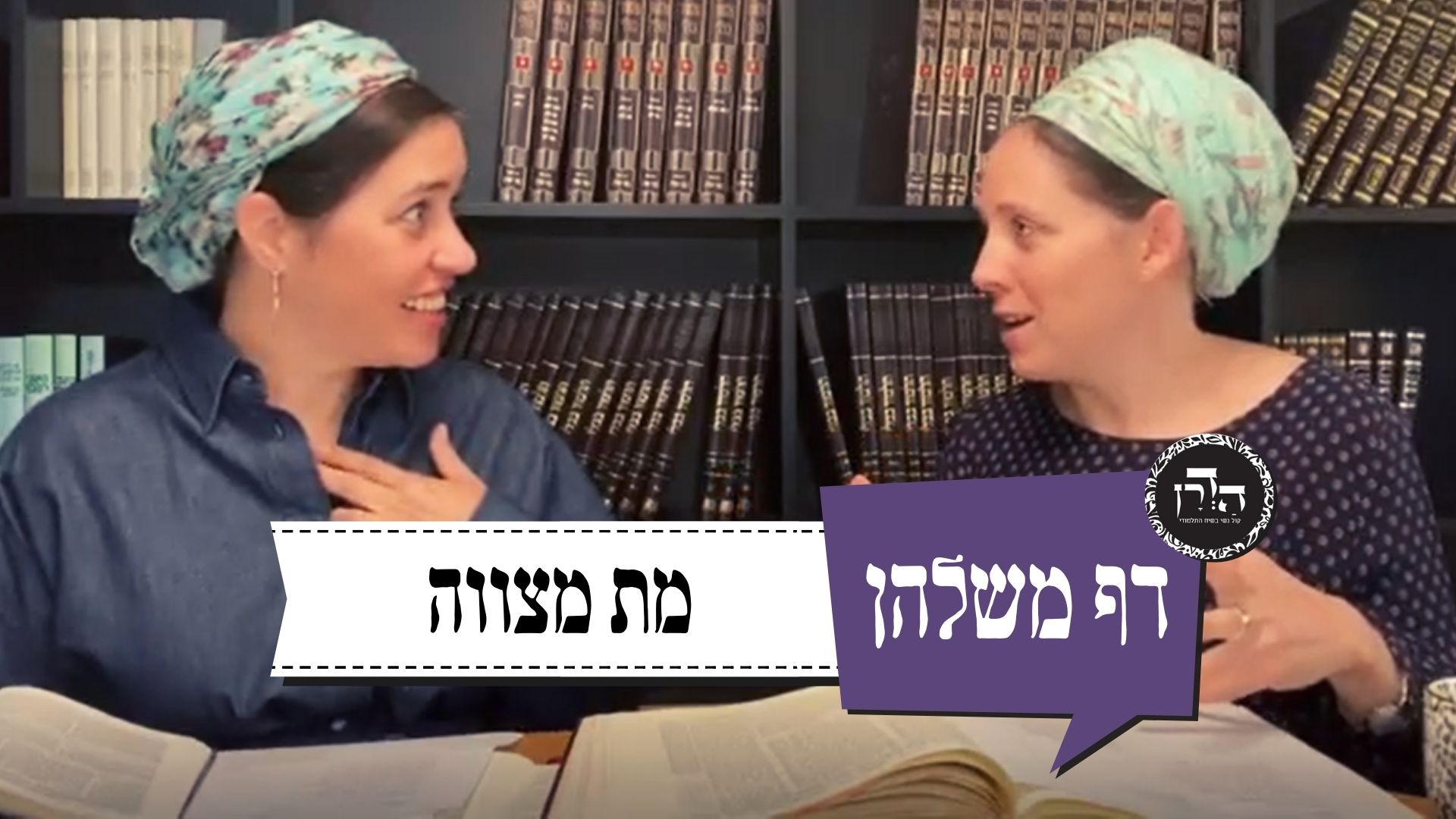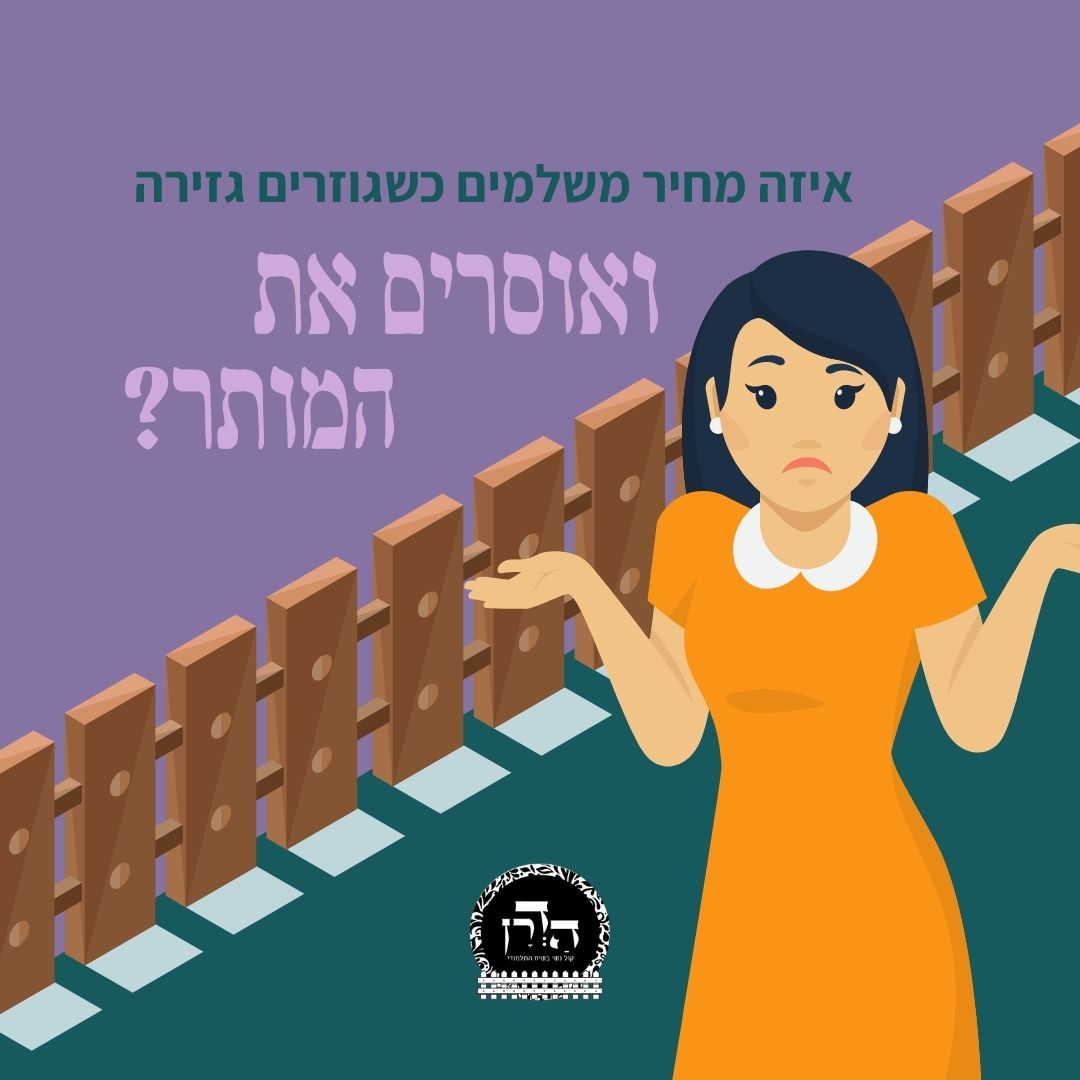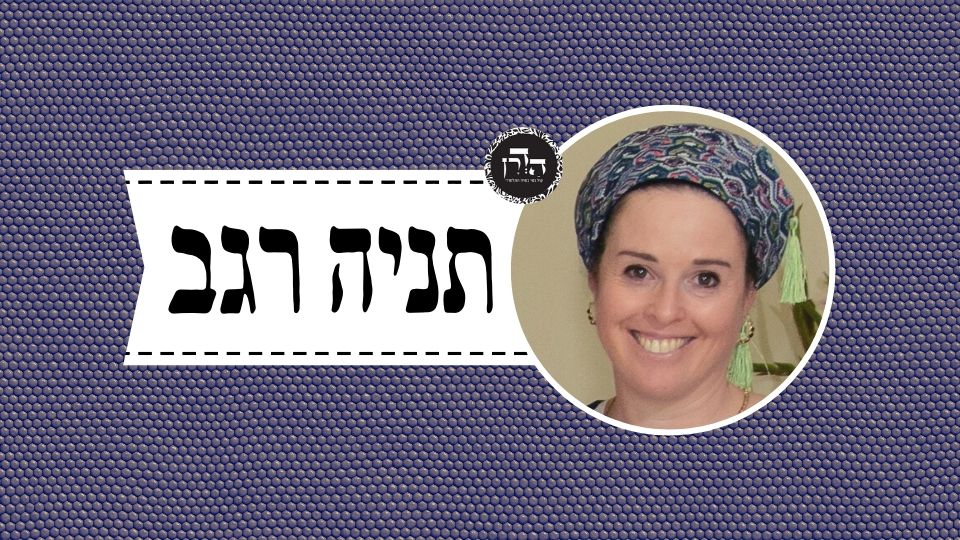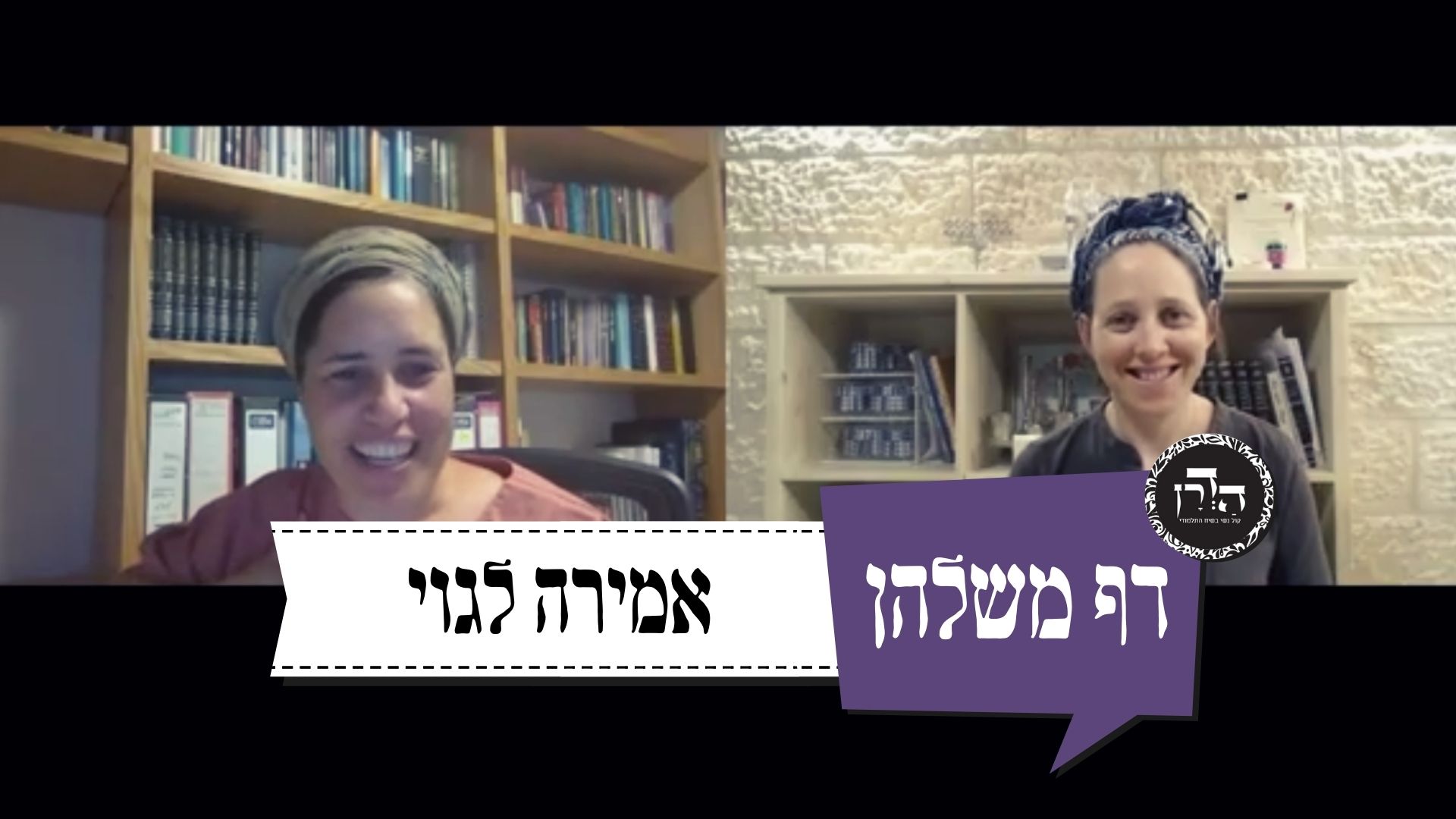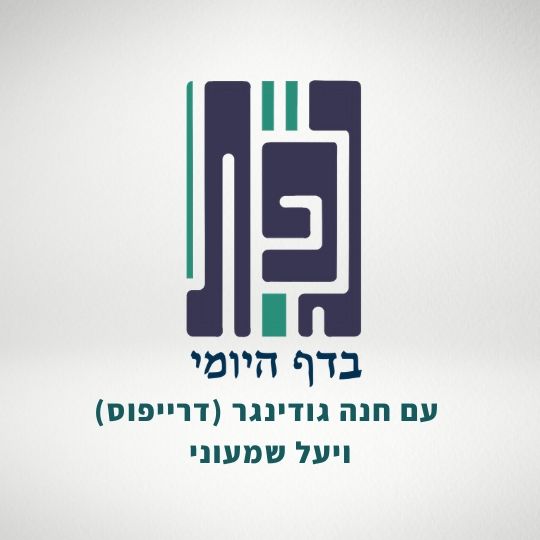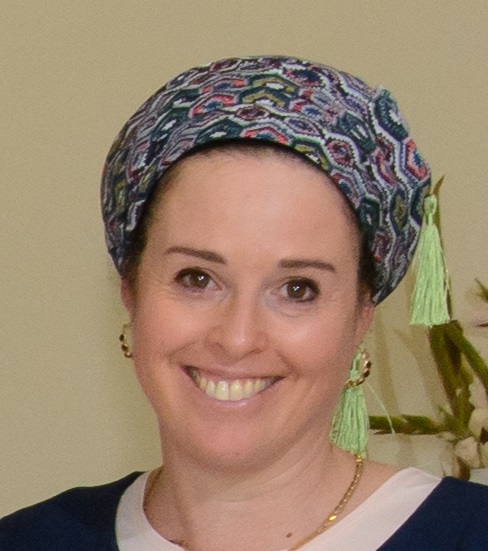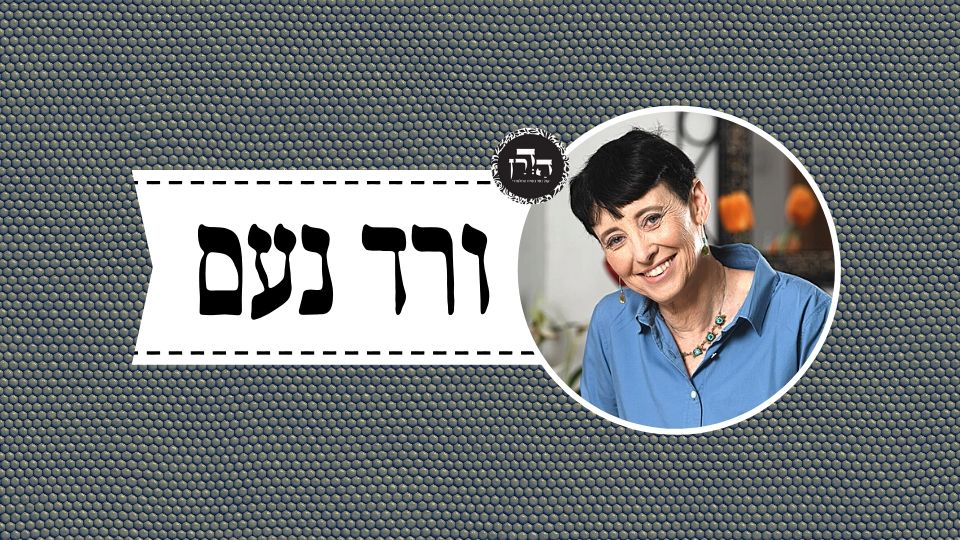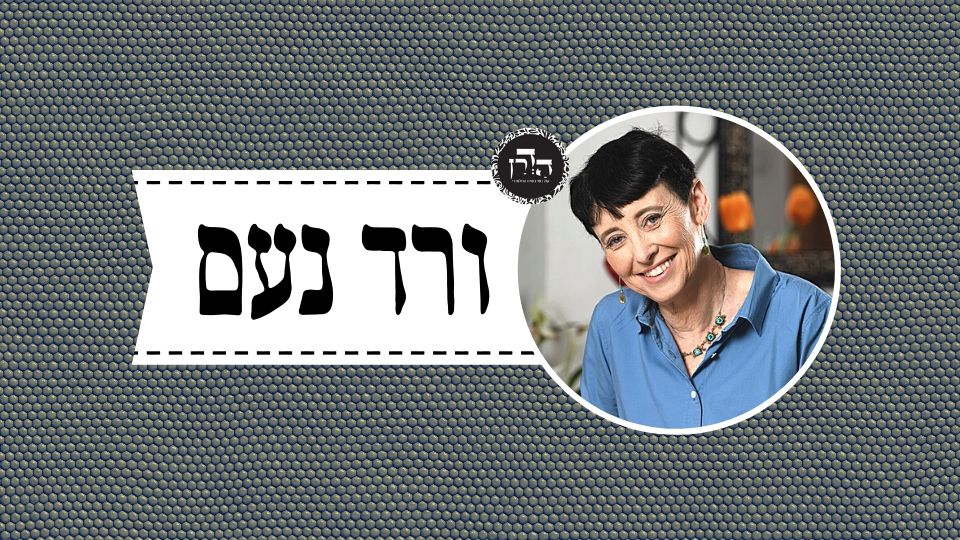המחלוקת בין ר’ יוחנן וחזקיה גם קיימת בין רבא לאביי. אם מוציא חפץ בשינוי, לא חייב. מה נחשב שינוי? אם תכנן להוציא בדרך מסויימת ובסוף יצא בדרך פחות שמור או יותר שמור, האם חייב או לא?
הלימוד השבוע מוקדש לזכות ולשלום הַיְימׇנוֹט אֱמוּנָה בַּת באנצ’י (קָסָאוּ) בת 11 שנעלמה במקום מגוריה בצפת, לפני שנתיים, ביום ט”ז אדר תשפ”ד (25.2.24), ולא נודעו עקבותיה.
הלימוד השבוע מוקדש למען ביטחון המדינה, החיילים והאזרחים, ולמען חירותו של העם האיראני. שנזכה בקרוב שיתקיים בנו הפסוק: "לַיְּהוּדִים הָיְתָה אוֹרָה וְשִׂמְחָה וְשָׂשֹׂן וִיקָר”.
הלימוד השבוע מוקדש לזכות וְלִשְׁלוֹם הָיימָנוֹט אֱמוּנָה בַּת באנצ’י (קָסָאוּ), בת 11 שנעלמה במקום מגוריה בצפת, לפני שנתיים, ביום ט”ז אדר תשפ״ד (25.2.24), ולא נודעו עקבותיה. אנו מתפללים שֶׁתִּמָּצֵא וְתוּשַׁב לביתה במהרה!
רוצה להקדיש שיעור?

כלים
הלימוד השבוע מוקדש לזכות ולשלום הַיְימׇנוֹט אֱמוּנָה בַּת באנצ’י (קָסָאוּ) בת 11 שנעלמה במקום מגוריה בצפת, לפני שנתיים, ביום ט”ז אדר תשפ”ד (25.2.24), ולא נודעו עקבותיה.
הלימוד השבוע מוקדש למען ביטחון המדינה, החיילים והאזרחים, ולמען חירותו של העם האיראני. שנזכה בקרוב שיתקיים בנו הפסוק: "לַיְּהוּדִים הָיְתָה אוֹרָה וְשִׂמְחָה וְשָׂשֹׂן וִיקָר”.
הלימוד השבוע מוקדש לזכות וְלִשְׁלוֹם הָיימָנוֹט אֱמוּנָה בַּת באנצ’י (קָסָאוּ), בת 11 שנעלמה במקום מגוריה בצפת, לפני שנתיים, ביום ט”ז אדר תשפ״ד (25.2.24), ולא נודעו עקבותיה. אנו מתפללים שֶׁתִּמָּצֵא וְתוּשַׁב לביתה במהרה!
כלים
העמקה
רוצה להבין מה באמת קורה מתחת לפני השטח של הסוגיה?
שיעורים, פודקאסטים והרחבות של מיטב המורות שלנו יפתחו לך עוד זוויות וכיווני חשיבה.
חדשה בלימוד הגמרא?
זה הדף הראשון שלך? איזו התרגשות עצומה! יש לנו בדיוק את התכנים והכלים שיעזרו לך לעשות את הצעדים הראשונים ללמידה בקצב וברמה שלך, כך תוכלי להרגיש בנוח גם בתוך הסוגיות המורכבות ומאתגרות.
פסיפס הלומדות שלנו
גלי את קהילת הלומדות שלנו, מגוון נשים, רקעים וסיפורים. כולן חלק מתנועה ומסע מרגש ועוצמתי.
שבת צב
דְּאִי בָּעֵי מְפַקַּע לֵיהּ וְשָׁקֵיל! בְּנִסְכָּא. וְכֵיוָן דְּאִיכָּא שְׁנָצִין, מַפֵּיק לֵיהּ עַד פּוּמֵּיהּ וְשָׁרֵי וְשָׁקֵיל, וּשְׁנָצִין אֲגִידִי מִגַּוַּאי! דְּלֵיכָּא שְׁנָצִין. וְאִיבָּעֵית אֵימָא דְּאִית לֵיהּ, וּמְכָרְכִי עִילָּוֵיהּ.
for if he wishes, he can tear the seam and take the money. The Gemara answers: Here, it is referring to long metal strips. As long as the entire purse is not in the public domain, he did not acquire any of the long strips, and he is not liable for theft. The Gemara asks: And since the purse has laces to close its opening, to be liable for theft it is sufficient that he carry it out so that its mouth is in the public domain, as he can untie the straps and remove the contents of the purse. And since the laces remain bound inside the private domain, he is not yet liable for violating the prohibition of Shabbat. The Gemara answers: This is referring to a case where the purse does not have laces. And if you wish, say instead that it is referring to a case where it has laces, and the laces are wound around the purse.
וְכֵן אָמַר רָבָא: לֹא שָׁנוּ אֶלָּא בְּקוּפָּה מְלֵאָה קִישּׁוּאִין וְדִלּוּעִין, אֲבָל מְלֵאָה חַרְדָּל — חַיָּיב. אַלְמָא קָסָבַר אֶגֶד כְּלִי לָא שְׁמֵיהּ אֶגֶד. אַבָּיֵי אֲמַר: אֲפִילּוּ מְלֵאָה חַרְדָּל — פָּטוּר, אַלְמָא קָסָבַר אֶגֶד כְּלִי שְׁמֵיהּ אֶגֶד. קָם אַבָּיֵי בְּשִׁיטְתֵיהּ דְּרָבָא, קָם רָבָא בְּשִׁיטְתֵיהּ דְּאַבָּיֵי, וְרָמֵי דְּאַבָּיֵי אַדְּאַבָּיֵי, וְרָמֵי דְּרָבָא אַדְּרָבָא.
There is a dispute between Abaye and Rava that parallels the dispute between Ḥizkiya and Rabbi Yoḥanan. And, so too, Rava said: They only taught in the mishna that one is exempt with regard to carrying out a basket full of cucumbers and gourds. However, for carrying out a basket full of mustard seeds, he is liable. Apparently, Rava holds: fusion of several objects in a single vessel is not considered fusion. Abaye said: Even if the basket is full of mustard seeds, he is exempt. Apparently, Abaye holds: Fusion of several objects in a single vessel is considered fusion. The Gemara comments: Abaye later assumed the opinion of Rava, and Rava assumed the opinion of Abaye. And a contradiction is raised between one statement of Abaye and another statement of Abaye; and a contradiction is raised between one statement of Rava and another statement of Rava.
דְּאִיתְּמַר: הַמּוֹצִיא פֵּירוֹת לִרְשׁוּת הָרַבִּים, אַבָּיֵי אָמַר: בַּיָּד — חַיָּיב, בִּכְלִי — פָּטוּר. וְרָבָא אָמַר: בַּיָּד — פָּטוּר, בִּכְלִי — חַיָּיב!
As it was stated that they disputed the matter of one who carries out fruit into the public domain. Abaye said: If he carried them out in his hand, he is liable even if the rest of his body remained in the private domain because fusion of several objects in his hand is not considered fusion. However, if he carried them out in a vessel, and part of the vessel remained in the private domain, he is exempt. And Rava said: If he carried them out in his hand, he is exempt because the legal status of his hand is determined by the status of the rest of the body. However, if he carried them out in a vessel, he is liable.
אֵיפוֹךְ: בַּיָּד — חַיָּיב. וְהָתְנַן: פָּשַׁט בַּעַל הַבַּיִת אֶת יָדוֹ לַחוּץ, וְנָטַל הֶעָנִי מִתּוֹכָהּ אוֹ שֶׁנָּתַן לְתוֹכָהּ וְהִכְנִיס — שְׁנֵיהֶן פְּטוּרִין. הָתָם — לְמַעְלָה מִשְּׁלֹשָׁה, הָכָא — לְמַטָּה מִשְּׁלֹשָׁה.
These are contrary to their opinions stated above. The Gemara answers: Reverse the opinions, and say that Rava was the one who said: If he carried it out in his hand, he is liable. The Gemara raises an objection. Didn’t we learn in the mishna: In a case where the homeowner extended his hand into the public domain, and either the poor person took an object from the homeowner’s hand and placed it in the public domain, or the poor person placed an object into the homeowner’s hand and the homeowner carried the object into the private domain, both are exempt. Apparently, one is not liable if he merely moved an object in his hand into the public domain. The Gemara answers: There, in the mishna, it is referring to a case where his hand was above three handbreadths from the ground. The object in his hand, therefore, does not have the legal status of having been placed on the ground, and he is exempt. Here, it is referring to a case where his hand was below three handbreadths off the ground. Anything that is within three handbreadths off the ground has the legal status of having been placed on the ground.
מַתְנִי׳ הַמּוֹצִיא, בֵּין בִּימִינוֹ בֵּין בִּשְׂמֹאלוֹ, בְּתוֹךְ חֵיקוֹ אוֹ עַל כְּתֵיפָיו — חַיָּיב, שֶׁכֵּן מַשָּׂא בְּנֵי קְהָת. כִּלְאַחַר יָדוֹ, בְּרַגְלוֹ, בְּפִיו וּבְמַרְפְּקוֹ, בְּאׇזְנוֹ וּבִשְׂעָרוֹ, וּבְפוּנְדָּתוֹ וּפִיהָ לְמַטָּה, בֵּין פּוּנְדָּתוֹ לַחֲלוּקוֹ, וּבִשְׂפַת חֲלוּקוֹ, בְּמִנְעָלוֹ, בְּסַנְדָּלוֹ — פָּטוּר, שֶׁלֹּא הוֹצִיא כְּדֶרֶךְ הַמּוֹצִיאִין.
MISHNA: One who carries out an object into the public domain on Shabbat, whether he carried it out in his right hand or in his left hand, whether he carried it in his lap or on his shoulders, he is liable. All of these are typical methods of carrying out an object, as this was the method of carrying the sacred vessels of the Tabernacle employed by the sons of Kehat in the desert. All labors prohibited on Shabbat are derived from the Tabernacle, including the prohibited labor of carrying out from domain to domain. But one who carries an object out in an unusual, backhanded manner, or with his foot, or with his mouth, or with his elbow, with his ear, or with his hair, or with his belt [punda] whose opening faced downward, or between his belt and his cloak, or with the hem of his cloak, or with his shoe, or with his sandal, he is exempt because he did not carry it out in a manner typical of those who carry.
גְּמָ׳ אָמַר רַבִּי אֶלְעָזָר: הַמּוֹצִיא מַשּׂאוֹי לְמַעְלָה מֵעֲשָׂרָה טְפָחִים — חַיָּיב, שֶׁכֵּן מַשָּׂא בְּנֵי קְהָת. וּמַשָּׂא בְּנֵי קְהָת מְנָלַן? דִּכְתִיב: ״עַל הַמִּשְׁכָּן וְעַל הַמִּזְבֵּחַ סָבִיב״ — מַקִּישׁ מִזְבֵּחַ לְמִשְׁכָּן: מָה מִשְׁכָּן עֶשֶׂר אַמּוֹת, אַף מִזְבֵּחַ עֶשֶׂר אַמּוֹת.
GEMARA: Rabbi Elazar said: One who carries out a load from the private domain to the public domain, even if he does so at a height above ten handbreadths, which is beyond the parameters of the public domain, he is liable, as this was the method of carrying utilized by the sons of Kehat. The Gemara asks: And from where do we derive that the method of carrying utilized by the sons of Kehat was above ten handbreadths? The Gemara answers: For it is written about the Levites’ carrying: “And the hangings of the courtyard, and the screen for the courtyard entrance which surrounds the Tabernacle, and the altar, and its cords for all of its service” (Numbers 3:26). This verse juxtaposes the altar to the Tabernacle. It is derived that just as the Tabernacle was ten cubits high, so too, the altar was ten cubits high. The verse that indicates otherwise: “And you shall make the altar…and its height should be three cubits” (Exodus 27:1), must be understood differently.
וּמִשְׁכָּן גּוּפֵיהּ מְנָלַן? דִּכְתִיב: ״עֶשֶׂר אַמּוֹת אֹרֶךְ הַקָּרֶשׁ״, וּכְתִיב: ״וַיִּפְרֹשׂ אֶת הָאֹהֶל עַל הַמִּשְׁכָּן״, וְאָמַר רַב: מֹשֶׁה רַבֵּינוּ פְּרָשׂוֹ. מִכָּאן אַתָּה לָמֵד גּוֹבְהָן שֶׁל לְוִיִּים עֶשֶׂר אַמּוֹת. וּגְמִירִי דְּכֹל טוּנָא דְּמִידְּלֵי בְּמוֹטוֹת — תִּילְתָּא מִלְּעֵיל וּתְרֵי תִּילְתֵי מִלְּתַחַת, אִישְׁתְּכַח דַּהֲוָה מִידְּלֵי טוּבָא.
The Gemara asks: And from where do we derive that the Tabernacle itself was carried above ten handbreadths? The Gemara answers: As it is written: “And you shall make the boards for the Tabernacle out of acacia wood standing upright, the length of a board shall be ten cubits” (Exodus 26:15–16). And it is written with regard to the construction of the Tabernacle: “And he spread the tent over the Tabernacle, and he placed the cover for the tent on top of it as God commanded Moses” (Exodus 40:19). And Rav said: Moses, our teacher, spread it himself. From here you can derive that the height of the Levites was ten cubits. If Moses was capable of standing and spreading the cover over the tent by himself, he must have been at least ten cubits tall. Presumably, that was the height of the rest of the Levites as well. And they learned through tradition that every burden that is carried with poles, one-third of the burden is above the porter’s height, and two-thirds are below his height. It is found, then, that the altar was very high, as if they carried the altar on poles, the bottom of the altar was at least one-third of ten cubits, twenty handbreadths, off the ground.
וְאִיבָּעֵית אֵימָא: מֵאָרוֹן. דְּאָמַר מָר: אָרוֹן תִּשְׁעָה וְכַפּוֹרֶת טֶפַח. הֲרֵי כָּאן עֲשָׂרָה, וּגְמִירִי דְּכֹל טוּנָא דְּמִידְּלֵי בְּמוֹטוֹת — תִּילְתָּא מִלְּעֵיל וּתְרֵי תִּילְתֵי מִלְּרַע, אִישְׁתְּכַח דְּמִלְּמַעְלָה מֵעֲשָׂרָה הֲוָה קָאֵי. וְלִיגְמַר מִמֹּשֶׁה? דִּילְמָא מֹשֶׁה שָׁאנֵי, דְּאָמַר מָר: אֵין הַשְּׁכִינָה שׁוֹרָה אֶלָּא עַל חָכָם גִּבּוֹר וְעָשִׁיר וּבַעַל קוֹמָה.
And if you wish, say instead that the Levites were not extraordinarily tall, and this can be derived from the Ark of the Covenant, as the Master said: The Ark itself was nine handbreadths tall as stated in the Torah, and the Ark-cover was one handbreadth, for a total of ten. And they learned through tradition that every burden that is carried with poles, one-third of the burden is above the porter’s height and two-thirds are below his height. It is found, then, that the bottom of the Ark stood ten handbreadths above the ground. The Gemara asks: And let us derive it from Moses, and why was the first proof insufficient? The Gemara answers: Perhaps Moses was different from the other Levites and taller than they were, as the Master said: The Divine Presence only rests upon a person who is wise, mighty, wealthy, and tall. Since the Divine Presence rested on Moses, he had to be tall.
אָמַר רַב מִשּׁוּם רַבִּי חִיָּיא: הַמּוֹצִיא מַשּׂאוֹי בְּשַׁבָּת עַל רֹאשׁוֹ — חַיָּיב חַטָּאת, שֶׁכֵּן אַנְשֵׁי הוּצָל עוֹשִׂין כֵּן. וְאַנְשֵׁי הוּצָל רוּבָּא דְעָלְמָא?! אֶלָּא, אִי אִיתְּמַר הָכִי אִיתְּמַר: אָמַר רַב מִשּׁוּם רַבִּי חִיָּיא: אֶחָד מִבְּנֵי הוּצָל שֶׁהוֹצִיא מַשּׂוֹי עַל רֹאשׁוֹ בְּשַׁבָּת — חַיָּיב, שֶׁכֵּן בְּנֵי עִירוֹ עוֹשִׂין כֵּן. וְתִיבְטַל דַּעְתּוֹ אֵצֶל כׇּל אָדָם! אֶלָּא, אִי אִיתְּמַר הָכִי אִיתְּמַר: הַמּוֹצִיא מַשּׂוֹי עַל רֹאשׁוֹ — פָּטוּר,
Rav said in the name of Rabbi Ḥiyya: One who carries out a burden on his head on Shabbat is liable to bring a sin-offering, as the people of Hotzal do so. They would typically carry burdens on their heads. The Gemara asks: And do the people of Hotzal constitute the majority of the world? Even if in one place it is a typical method of carrying a burden, it remains an atypical method of carrying in the rest of the world. Rather, if this ruling was stated, it was stated as follows. Rav said in the name of Rabbi Ḥiyya: If a resident of Hotzal carried out a burden on his head on Shabbat he is liable, as the people of his city do so. The Gemara asks again: Even if the inhabitants of his city do this, let his intention be rendered irrelevant by the opinions of all other people. If an individual or small group of people conduct themselves in an atypical manner, their conduct is not rendered typical. Typical conduct is determined by the majority of people. Rather, if this was stated, it was stated as follows. One who carries out a burden on his head is exempt.
וְאִם תִּמְצָא לוֹמַר אַנְשֵׁי הוּצָל עוֹשִׂין כֵּן — בָּטְלָה דַּעְתָּן אֵצֶל כׇּל אָדָם.
And if you say that the people of Hotzal do so and therefore they should be liable, their intention is rendered irrelevant by the opinions of all other people.
מַתְנִי׳ הַמִּתְכַּוֵּין לְהוֹצִיא לְפָנָיו, וּבָא לוֹ לְאַחֲרָיו — פָּטוּר. לְאַחֲרָיו וּבָא לוֹ לְפָנָיו — חַיָּיב. בֶּאֱמֶת אָמְרוּ: הָאִשָּׁה הַחוֹגֶרֶת בְּסִינָר, בֵּין מִלְּפָנֶיהָ וּבֵין מִלְּאַחֲרֶיהָ — חַיֶּיבֶת, שֶׁכֵּן רָאוּי לִהְיוֹת חוֹזֵר. רַבִּי יְהוּדָה אוֹמֵר: אַף מְקַבְּלֵי פִתְקִין.
MISHNA: One who intends to carry out an object with the object before him, and as he was walking the object came to be carried behind him, is exempt. However, if he intended to carry it out behind him and it came to be carried before him, he is liable. In truth they said: A woman who girded herself in a pants-like sinar worn beneath the outer garments, whether she placed an object before her or behind her, and it came to be carried on the other side, she is liable, as it is common for the sinar to be reversed. Rabbi Yehuda says: Even those royal couriers, who receive notes [pittakin], carry those notes in their belts, and are not particular where on their belt they carry the notes (Rav Hai Gaon), are liable for carrying out the notes whether they carried them before them or behind them.
גְּמָ׳ מַאי שְׁנָא לְפָנָיו וּבָא לוֹ לְאַחֲרָיו דְּפָטוּר — דְּלָא אִתְעֲבִידָא מַחְשַׁבְתּוֹ, לְאַחֲרָיו וּבָא לוֹ לְפָנָיו נָמֵי, הָא לָא אִתְעֲבִידָא מַחְשַׁבְתּוֹ! אָמַר רַבִּי אֶלְעָזָר: תַּבְרַהּ, מִי שֶׁשָּׁנָה זוֹ לֹא שָׁנָה זוֹ. אָמַר רָבָא: וּמַאי קוּשְׁיָא? דִילְמָא: לְפָנָיו וּבָא לוֹ לְאַחֲרָיו הַיְינוּ טַעְמָא דְּפָטוּר — דְּנִתְכַּוֵּון לִשְׁמִירָה מְעוּלָּה וְעָלְתָה בְּיָדוֹ שְׁמִירָה פְּחוּתָה, לְאַחֲרָיו וּבָא לוֹ לְפָנָיו הַיְינוּ טַעְמָא דְּחַיָּיב — דְּנִתְכַּוֵּון לִשְׁמִירָה פְּחוּתָה וְעָלְתָה בְּיָדוֹ שְׁמִירָה מְעוּלָּה.
GEMARA: The Gemara asks: What is different about the case of one who intended to carry an object before him and it came to be carried behind him that he is exempt? The reason is that his intention was not realized. Since he did not perform the act that he intended to perform, he is exempt. If so, then even in the case of one who intended to carry an object behind him, and it came to be carried before him, he should also be exempt because his intention was not realized. Rabbi Elazar said: This mishna is disjointed, in the sense that it cites the opinions of two different Sages. He who taught this halakha did not teach that halakha. Rava said: And what difficulty is there here? Perhaps it can be explained as follows. With regard to one who intended to carry an object before him, and it came to be carried behind him, this is the reason that he is exempt: He intended to provide the object with outstanding protection, seeing it at all times, and ultimately he managed to provide the object with reduced protection. Since that was not his intention, it is not considered a prohibited labor and he is exempt. Whereas one who intended to carry an object behind him, and it came to be carried before him, this is the reason he is liable: He intended to provide the object with reduced protection, and ultimately he managed to provide the object with outstanding protection.
אֶלָּא מַאי קוּשְׁיָא — דִּיּוּקָא דְמַתְנִיתִין קַשְׁיָא: הַמִּתְכַּוֵּין לְהוֹצִיא לְפָנָיו וּבָא לוֹ לְאַחֲרָיו — פָּטוּר, הָא לְאַחֲרָיו וּבָא לוֹ לְאַחֲרָיו — חַיָּיב. אֵימָא סֵיפָא: לְאַחֲרָיו וּבָא לוֹ לְפָנָיו הוּא דְּחַיָּיב, הָא לְאַחֲרָיו וּבָא לוֹ לְאַחֲרָיו פָּטוּר! אָמַר רַבִּי אֶלְעָזָר: תַּבְרַהּ, מִי שֶׁשָּׁנָה זוֹ לֹא שָׁנָה זוֹ.
Rather, what is the difficulty here? It is the inference inferred from the mishna that is difficult. One who intends to carry out an object before him, and the object came to be carried behind him, is exempt. By inference: One who intends to carry out an object behind him, and indeed, the object came to be carried behind him, is liable. Say the latter clause of the mishna: One who intends to carry out an object behind him, and it came to be carried before him, is the case where he is liable. By inference: One who intends to carry out an object behind him, and indeed, the object came to be carried behind him, is exempt. The inference from the first clause contradicts the inference from the latter clause. Rabbi Elazar said: This mishna is disjointed. He who taught this halakha did not teach that halakha.
אָמַר רַב אָשֵׁי: מַאי קוּשְׁיָא? דִּילְמָא לָא מִיבַּעְיָא קָאָמַר: לָא מִיבַּעְיָא לְאַחֲרָיו וּבָא לוֹ לְאַחֲרָיו דְּחַיָּיב — דְּאִיתְעֲבִידָא מַחְשַׁבְתּוֹ, אֶלָּא אֲפִילּוּ לְאַחֲרָיו וּבָא לוֹ לְפָנָיו אִיצְטְרִיכָא לֵיהּ. סָלְקָא דַּעְתָּךְ אָמֵינָא, הוֹאִיל וְלָא אִיתְעֲבִידָא מַחְשַׁבְתּוֹ לָא לִיחַיַּיב — קָא מַשְׁמַע לַן דְּנִתְכַּוֵּון לִשְׁמִירָה פְּחוּתָה וְעָלְתָה בְּיָדוֹ שְׁמִירָה מְעוּלָּה דְּחַיָּיב.
Rav Ashi said: What difficulty is there here? Perhaps the mishna is stating the halakha utilizing the following didactic style: It was not necessary, and it should be understood as follows. It was not necessary to teach that a person who intended to carry the object behind him, and it came to be carried behind him, is liable. That is obvious because his intention was realized. However, it was necessary for the mishna to teach that even in a case where he intended to carry the object behind him, and it came to be carried before him, he is liable. It would have entered your mind to say: Since his intention was not realized, he should not be liable. Therefore, the mishna teaches us: Since he intended to provide the object with reduced protection, and ultimately he managed to provide the object with outstanding protection, he is liable.
וּלְאַחֲרָיו וּבָא לוֹ לְאַחֲרָיו תַּנָּאֵי הִיא. דְּתַנְיָא: הַמּוֹצִיא מָעוֹת בְּפוּנְדָּתוֹ וּפִיהָ לְמַעְלָה — חַיָּיב. פִּיהָ לְמַטָּה — רַבִּי יְהוּדָה מְחַיֵּיב, וַחֲכָמִים פּוֹטְרִין. אָמַר לָהֶן רַבִּי יְהוּדָה: אִי אַתֶּם מוֹדִים בִּלְאַחֲרָיו וּבָא לוֹ לְאַחֲרָיו שֶׁהוּא חַיָּיב? וְאָמְרוּ לוֹ: וְאִי אַתָּה מוֹדֶה כִּלְאַחַר יָדוֹ וְרַגְלוֹ שֶׁהוּא פָּטוּר?
And the case where one intended to carry out the object behind him, and it came to be carried behind him, is the subject of a dispute between the tanna’im, as it was taught in a baraita: One who carried out coins in his money belt, and its opening was facing up, is liable because this is the typical method of carrying coins. However, if one carried it out with its opening facing down, Rabbi Yehuda deems him liable, and the Rabbis deem him exempt. Rabbi Yehuda said to the Rabbis: Do you not agree that in a case where one intends to carry the object behind him, and it came to be carried behind him, that he is liable? Apparently, one who intended to provide his object with reduced protection and realized that intention is liable. And they said to him: And do you not agree that one who carries out an object in a backhanded manner or with his foot is exempt? Apparently, carrying out an object in an atypical manner is not considered carrying.
אָמַר רַבִּי יְהוּדָה: אֲנִי אָמַרְתִּי דָּבָר אֶחָד וְהֵן אָמְרוּ דָּבָר אֶחָד. אֲנִי לֹא מָצָאתִי תְּשׁוּבָה לְדִבְרֵיהֶם וְהֵן לֹא מָצְאוּ תְּשׁוּבָה לִדְבָרַי. מִדְּקָאֲמַר לְהוּ ״אִי אַתֶּם מוֹדִין״ — לָאו מִכְּלָל דְּפָטְרִי רַבָּנַן? וְלִיטַעְמָיךְ, דְּקָאָמְרִי לֵיהּ ״אִי אַתָּה מוֹדֶה״ — מִכְּלָל דִּמְחַיֵּיב רַבִּי יְהוּדָה? וְהָתַנְיָא: לְאַחַר יָדוֹ וְרַגְלוֹ דִּבְרֵי הַכֹּל פָּטוּר!
Rabbi Yehuda said: I said one thing to the Rabbis in support of my opinion, and they said one thing to me. I did not find a response to their statement, and they did not find a response to my statement. From the fact that he said to them: Do you not agree that in a case where one intends to carry the object behind him, and it came to be carried behind him, he is liable? Can it not be inferred that the Sages deem one exempt in that case? Apparently, Rabbi Yehuda and the Rabbis dispute this matter. The Gemara asks: And according to your reasoning, from the fact that the Rabbis said to Rabbi Yehuda: Do you not agree that one who carries out an object in a backhanded manner is exempt, can it not be inferred that Rabbi Yehuda deems one liable, even for carrying out in a backhanded manner? Wasn’t it taught explicitly in a baraita: With regard to one who carries an object out in a backhanded manner or with his foot, everyone agrees that he is exempt?
אֶלָּא: לְאַחֲרָיו וּבָא לוֹ לְאַחֲרָיו, דִּבְרֵי הַכֹּל חַיָּיב. לְאַחַר יָדוֹ וְרַגְלוֹ, דִּבְרֵי הַכֹּל פָּטוּר. כִּי פְּלִיגִי, בְּפוּנְדָּתוֹ וּפִיהָ לְמַטָּה: מָר מְדַמֵּי לֵיהּ לְאַחֲרָיו וּבָא לוֹ לְאַחֲרָיו, וּמָר מְדַמֵּי לֵיהּ לְאַחַר יָדוֹ וְרַגְלוֹ.
Rather, the baraita should be understood as follows. With regard to one who intended to carry an object behind him, and the object came to be carried out behind him, everyone agrees that he is liable. With regard to one who carried out an object in a backhanded manner or with his foot, everyone agrees that he is exempt. Where they disagree is in a case where one carried coins in his money belt with its opening facing down. This Master, Rabbi Yehuda, likens it to the case of one who intended to carry an object behind him and the object came to be carried out behind him, and deems him liable; and this Master, the Rabbis, liken it to the case of one who carried out an object in a backhanded manner or with his foot, and deems him exempt.
בֶּאֱמֶת אָמְרוּ הָאִשָּׁה כּוּ׳. [תָּנָא כׇּל ״בֶּאֱמֶת״ — הֲלָכָה הִיא. רַבִּי יְהוּדָה אוֹמֵר אַף מְקַבְּלֵי פִתְקִין.] תָּנָא: שֶׁכֵּן לַבְלָרֵי מַלְכוּת עוֹשִׂין כֵּן.
We learned in the mishna: In truth they said: A woman who girded herself in a pants-like sinar, whether she placed an object before her or behind her, and it came to be carried on the other side, she is liable. It was taught in the Tosefta: In every instance that the mishna employs the phrase: In truth, that is the undisputed halakha. And we learned in the mishna: Rabbi Yehuda says that even those who receive notes, i.e., royal couriers who transmit messages, place notes in their belts, and are not particular about which side the note is on (Rav Hai Gaon), are liable for carrying out notes, whether they carry the notes out in front of them or behind them. We learned a different explanation: Because the royal scribes do this, they place their notes on all sides of their belts.
מַתְנִי׳ הַמּוֹצִיא כִּכָּר לִרְשׁוּת הָרַבִּים — חַיָּיב. הוֹצִיאוּהוּ שְׁנַיִם — פְּטוּרִין. לֹא יָכוֹל אֶחָד לְהוֹצִיאוֹ וְהוֹצִיאוּהוּ שְׁנַיִם — חַיָּיבִין. וְרַבִּי שִׁמְעוֹן פּוֹטֵר.
MISHNA: One who carries a large mass out to the public domain on Shabbat is liable. If two carried it out together, they are exempt because neither performed a complete prohibited labor. However, if one person is unable to carry it out alone, and therefore two people carried it out, they are liable. And Rabbi Shimon deems them exempt even in that case.
גְּמָ׳ אָמַר רַב יְהוּדָה אָמַר רַב, וְאָמְרִי לַהּ אָמַר אַבָּיֵי, וְאָמְרִי לַהּ בְּמַתְנִיתָא תָּנָא: זֶה יָכוֹל וְזֶה יָכוֹל — רַבִּי מֵאִיר מְחַיֵּיב, וְרַבִּי יְהוּדָה וְרַבִּי שִׁמְעוֹן פּוֹטְרִים. זֶה אֵינוֹ יָכוֹל וְזֶה אֵינוֹ יָכוֹל — רַבִּי יְהוּדָה וְרַבִּי מֵאִיר מְחַיְּיבִים וְרַבִּי שִׁמְעוֹן פּוֹטֵר. זֶה יָכוֹל וְזֶה אֵינוֹ יָכוֹל — דִּבְרֵי הַכֹּל חַיָּיב.
GEMARA: Rav Yehuda said that Rav said, and some say that Abaye said this, and some say that it was taught in a baraita: With regard to an action performed by two people, when this person is capable of performing it alone, and that person is capable of performing it alone, Rabbi Meir deems them liable, and Rabbi Yehuda and Rabbi Shimon deem them exempt. If both this person is incapable and that person is incapable of performing the action alone, and therefore they performed it together, Rabbi Yehuda and Rabbi Meir deem them liable, and Rabbi Shimon deems them exempt. If this person is capable, and that person is incapable, and they performed it together, everyone agrees that he is liable.
תַּנְיָא נָמֵי הָכִי: הַמּוֹצִיא כִּכָּר לִרְשׁוּת הָרַבִּים — חַיָּיב. הוֹצִיאוּהוּ שְׁנַיִם — רַבִּי מֵאִיר מְחַיֵּיב, וְרַבִּי יְהוּדָה אוֹמֵר: אִם לֹא יָכוֹל אֶחָד לְהוֹצִיאוֹ וְהוֹצִיאוּהוּ שְׁנַיִם — חַיָּיבִין, וְאִם לָאו — פְּטוּרִים, וְרַבִּי שִׁמְעוֹן פּוֹטֵר. מְנָא הָנֵי מִילֵּי? דְּתָנוּ רַבָּנַן: ״בַּעֲשֹׂתָהּ״ — הָעוֹשֶׂה אֶת כּוּלָּהּ וְלֹא הָעוֹשֶׂה אֶת מִקְצָתָהּ, כֵּיצַד? שְׁנַיִם שֶׁהָיוּ אוֹחֲזִין בְּמַלְגֵּז וְלוֹגְזִין, בְּכַרְכֵּר וְשׁוֹבְטִין, בְּקוּלְמוֹס וְכוֹתְבִין, בְּקָנֶה וְהוֹצִיאוּהוּ לִרְשׁוּת הָרַבִּים, יָכוֹל יְהוּ חַיָּיבִין — תַּלְמוּד לוֹמַר: ״בַּעֲשֹׂתָהּ״ — הָעוֹשֶׂה אֶת כּוּלָּהּ וְלֹא הָעוֹשֶׂה מִקְצָתָהּ.
That was also taught in a baraita: One who carries a large mass out to the public domain on Shabbat is liable. If two carried it out together, Rabbi Meir deems them liable, and Rabbi Yehuda says: If one is incapable of carrying it out, and two carried it out, they are liable. And if not, if each person is capable of carrying it out himself, and nevertheless they carried it out together, they are exempt. And Rabbi Shimon deems them exempt even if neither was capable of performing the action alone. The Gemara asks: From where are these matters derived? What is the biblical source of these halakhot? The Gemara answers that the source is as our Sages taught in Torat Kohanim, the halakhic midrash on Leviticus. It is written: “And if one person among the common people sins unwittingly by performing it, any one of God’s commandments not to be done, and be guilty” (Leviticus 4:27). The Gemara interpreted: “By performing it,” means that one who performs a transgression in its entirety is liable, and not one who performs part of it. How so? If two people were holding a pitchfork and gathering the stalks, or holding a shuttle and weaving the threads of the warp, or holding a quill and writing, or holding a reed and carrying it out to the public domain, I might have thought they are liable, therefore the verse states: “By performing it.” One who performs a transgression in its entirety is liable, and not one who performs only part of it.


